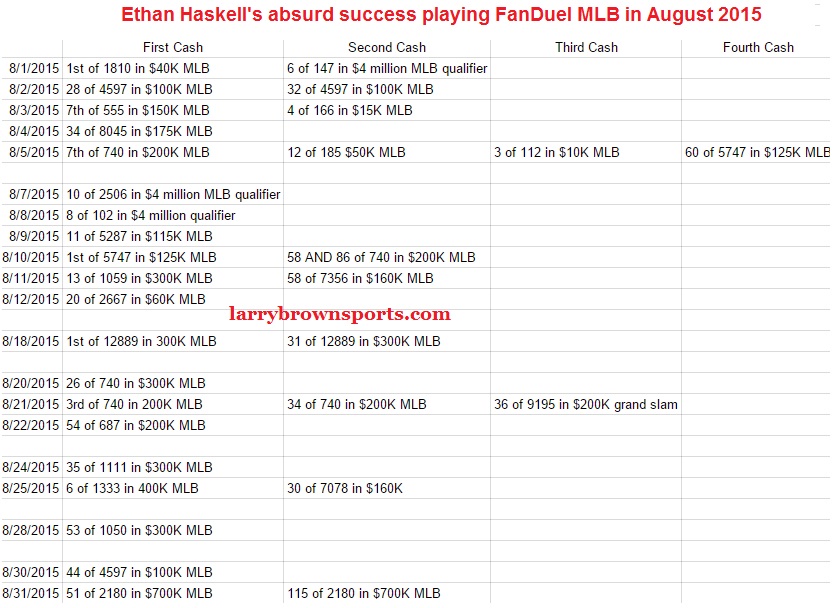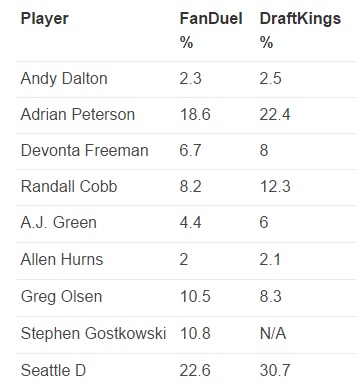
Ethan Haskell is a DraftKings employee at the center of a huge scandal involving daily fantasy sports games after he won $350,000 playing an NFL game on rival company FanDuel.
Haskell finished second out of 229,885 entrants on a FanDuel “$5M NFL Sunday Million” NFL competition in Week 3 in order to cash in on his $350,000 prize. A look at his fantasy profiles show that he has been raking it in big on FanDuel all year. It’s enough to make one wonder how he’s been so successful — could it be due to insider information?
Haskell’s undeniable success at daily fantasy sports brings into question what kind of data company employees have access to, and if or how they’re able to use it to their advantage by playing on competitor sites (the companies say they ban employees from playing on their own sites). However, DraftKings does have language allowing for employees to play to use their site.
“DraftKings employees may use the Website, and will from time to time do so for the purpose of testing the site user experience, socializing and competing with customers to build community, and other reasonable and fair uses at the discretion of DraftKings.”
What could all this mean? First let’s start with the basics.
Who is Ethan Haskell?
Haskell is the Written Content Manager at DraftKings.
According to his LinkedIn profile, Haskell has been with DraftKings since June 2014. He lists his job as “managing editors and overall goals/vision of the DraftKings Playbook – the written content provider of DraftKings.com.”
Based out of Boston, Haskell was a lead content editor for RotoGrinders for two years prior to signing on with DraftKings. He holds a bachelor’s degree in business/managerial economics from Allegheny College.
What has Ethan Haskell been doing that is controversial?
His records indicate that he has been playing daily fantasy games on rival site FanDuel at the same time he has been working for DraftKings. Though he is not allowed to play on his own site* (see exception listed above), one wonders whether he was somehow able to use information he learned through his job at DraftKings while playing on a competitor’s site. DraftKings and FanDuel as of Monday said they were no longer allowing employees to compete on rival sites.
What led to this scandal?
On Sunday, Sept. 27, Haskell posted the percentage owned chart for the Week 3 Millionaire Maker competition. This chart shows what percent of entrants in the competition “own” each player. The problem is Haskell posted this prior to the start of some of the remaining games that week, which would allow players to change their lineups based on the information.
This breach or “leak” by Haskell was pointed out on a RotoGrinders forum. Haskell was contacted about the leak and provided this explanation:
Hi All,
As Cal mentioned – this was published in error originally by myself. I’ve fixed the error and we’ll be putting checks in place to make sure it doesn’t happen again. As Cal mentioned, I was the only person with this data and as a DK employee, am not allowed to play on site. 100% my fault and I apologize for any issues.
Ethan
Could Ethan Haskell have been using his access to inside information at DraftKings to his advantage?
Let’s start with the $350,000 he won on FanDuel in Week 3. RotoGrinders co-founder Cal took up for Haskell and said no. He posted this on the initial forum about the controversy:
There is a narrative running on Twitter that Ethan had access to this data before lineups locked and used it to play on Fanduel. From what I’m told he received the ownership report well after lineups locked on Fanduel. There is plenty of merit in a debate about site employees playing on different sites, but we need to base that debate in reality. Ethan was not using this data to pick his week 3 teams on Fanduel, he was writing about this data for DK Playbook after his week 3 teams on Fanduel had already locked.
But you might think the numbers say otherwise. A look at Ethan Haskell’s Rotogrinders profile shows he has had tremendous success playing at FanDuel over the past year.
His RotoGrinders profile lists his 100 best game results.
– 83 from FanDuel, between Oct. 2014-present. All but 5 came in 2015
– 10 were from Fantasy Feud, all between April-July 2015
– 6 from DraftKings, all between Nov-Dec, 2013 before he worked for them
– 1 from DraftStreet in Nov. 2013
So, the majority of his best performances occurred when playing FanDuel over the past year, since his work with DraftKings began, though the chart is based on his top 100 TPOY results.
Seems suspicious to me. Even more so when you consider that Haskell won major points in 20 of 31 days in August playing big money MLB games on FanDuel:

Or for those who prefer a different visual:

Did Haskell suddenly start playing many more games and using more entries, and did that lead to all of his success? Did his success rate improve? That is unclear.
Wait a minute, what advantage would having inside information give a player?
Putting aside Ethan Haskell for a minute, let’s just talk about the concept of insider information here. If someone knows the ownership percentage of players, that person could choose his lineup to feature less commonly owned players whom he believe have high upsides. That would take away the potential for overlap with other people competing in the game.
The ownership percentages between DraftKings and FanDuel games seem to be very similar. This could mean that having information from one league could be helpful in another similar league. As an example, consider the ownership comparison chart for the week Haskell won $350,000 and his lineup used:

Another advantage is that if you have access to ownership information, you could theoretically take a look at the lineups of the best/smartest “sharps,” see what they’re doing, and adjust your lineup accordingly.
What do DraftKings and FanDuel have to say?
They issued the following statement on Monday:
Nothing is more important to DraftKings and FanDuel than the integrity of the games we offer to our customers. Both companies have strong policies in place to ensure that employees do not misuse any information at their disposal and strictly limit access to company data to only those employees who require it to do their jobs. Employees with access to this data are rigorously monitored by internal fraud control teams, and we have no evidence that anyone has misused it.
However, we continue to review our internal controls to ensure they are as strong as they can be. We also plan to work with the entire fantasy sports industry on this specific issue so that fans everywhere can continue to enjoy and trust the games they love.
Other issues noticed with the daily games.
In one fantasy event that was supposed to be single entries, one player noticed multiple entries by someone.
Ok @FanDuel, you guys are getting sketchier by the day. How do people have multi entries in a single entry app? pic.twitter.com/l8N96vGYZS
— Prince Of Darkness (@TheEndIsNir) October 2, 2015
Conclusion
The numbers seem suspicious to me, and the fantasy games are probably making the right move by preventing employees from playing on their own and competing sites. What do you think?
H/T DFS Report
**Article has been edited from its original form













